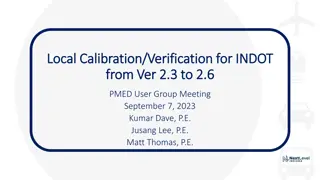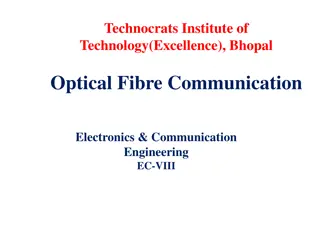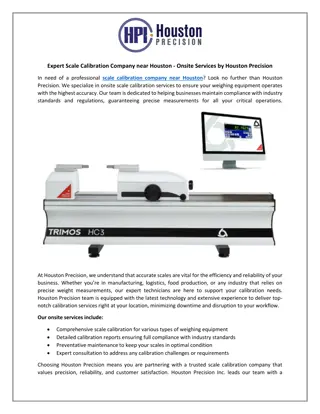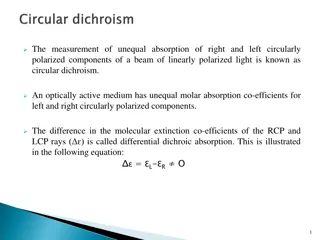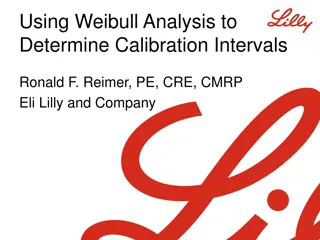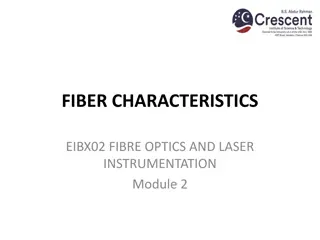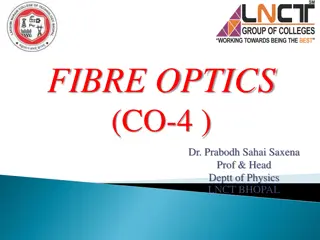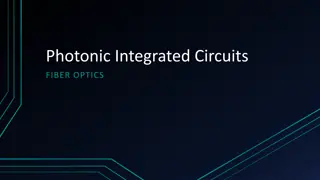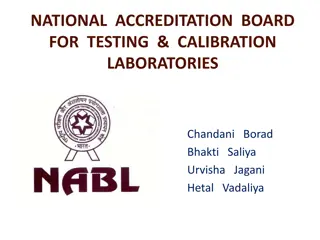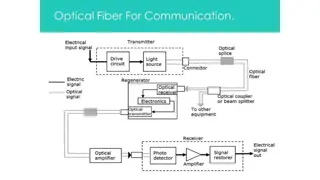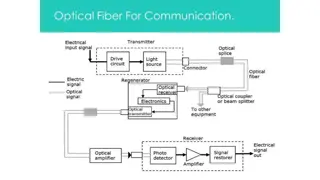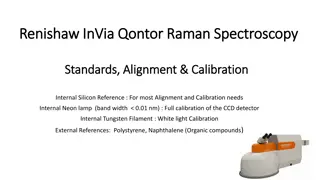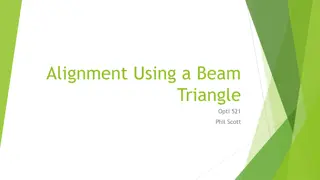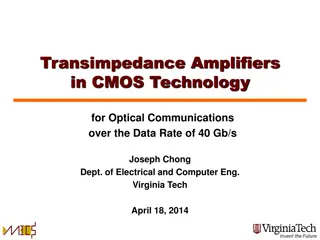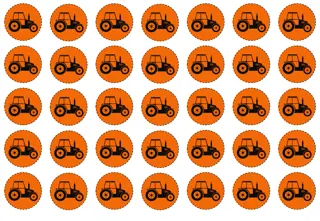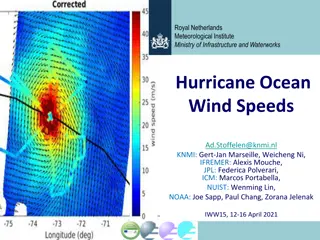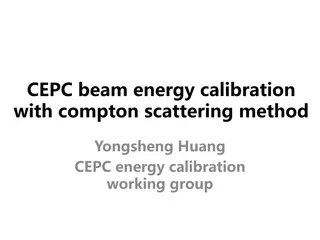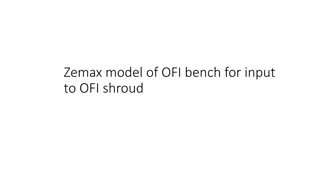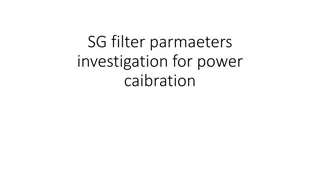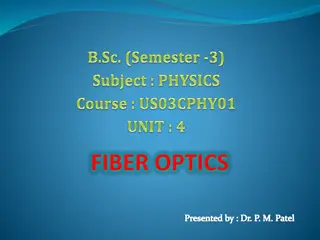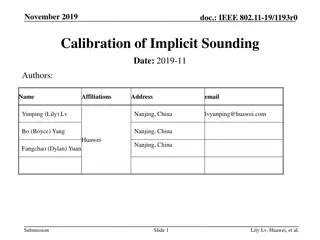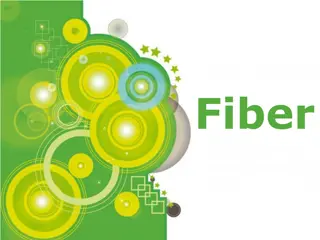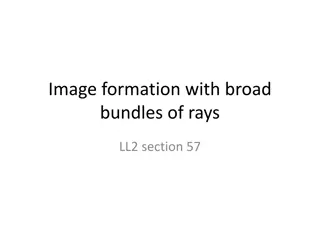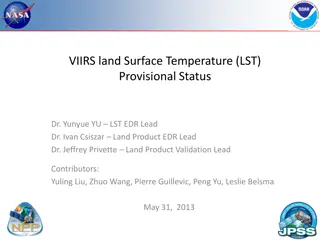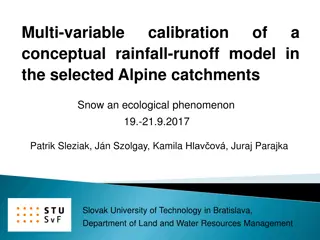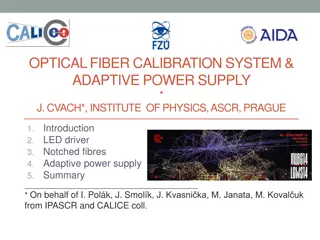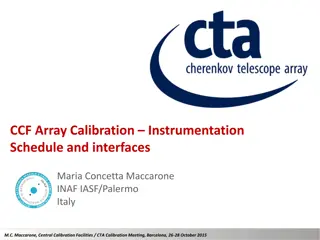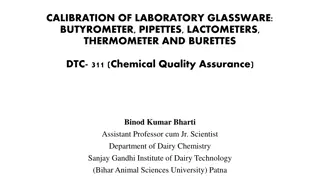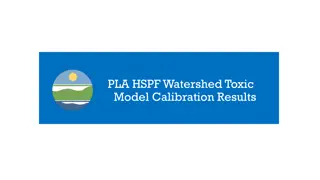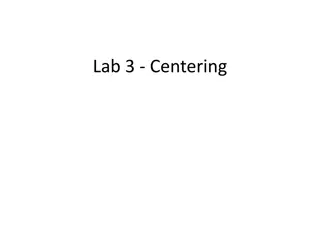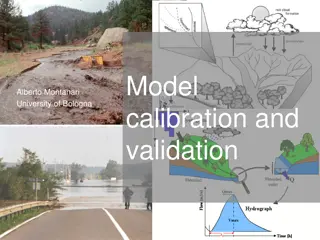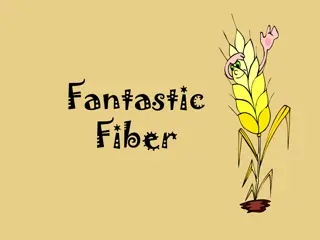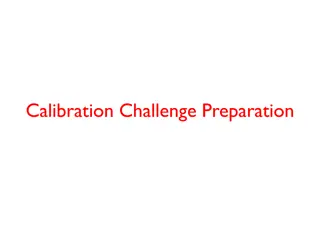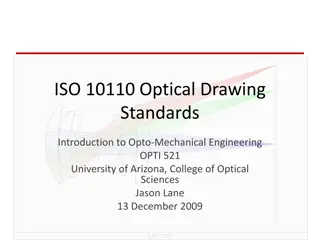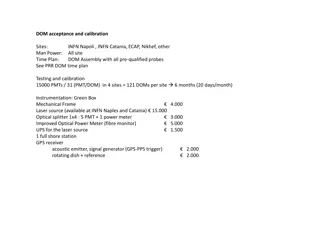How to Study for ASQ Calibration Technician (CCT) Certification Exam
Click Here--- https:\/\/bit.ly\/3HFBYpa ---Get complete detail on ASQ exam guide to crack Calibration Technician. You can collect all information on ASQ tutorial, practice test, books, study material, exam questions, and syllabus. Firm your knowledge on Calibration Technician and get ready to crack
3 views • 13 slides
Precision Perfected: CNC Machine Tool Calibration
Ensure optimal performance and accuracy in your machining processes with our CNC machine tool calibration services. Our expert technicians meticulously calibrate your equipment to industry standards, maximizing efficiency and quality. Trust us to fine-tune your machinery for superior precision and p
4 views • 8 slides
Local Calibration and Verification for INDOT - PMED User Group Meeting
This presentation highlights the local calibration and verification process for the Indiana Department of Transportation (INDOT) from Version 2.3 to 2.6. The session covers the objectives, data collection, processing, and analysis conducted by Kumar Dave, Jusang Lee, and Matt Thomas. INDOT's key fac
1 views • 29 slides
Understanding Optical Fiber Signal Degradation in Communication Engineering
Technocrats Institute of Technology (Excellence) in Bhopal delves into the concepts of signal degradation in optical fiber communication, focusing on attenuation, distortion mechanisms, and measurement techniques. The institute emphasizes the importance of signal attenuation and its impact on inform
4 views • 56 slides
Expert Scale Calibration Company Near Houston - Onsite Services
In need of a professional scale calibration company near Houston? Look no further than Houston Precision. We specialize in onsite scale calibration services to ensure your weighing equipment operates with the highest accuracy. Our team is dedicated to helping businesses maintain compliance with indu
0 views • 2 slides
Reliable Fiber Optic Contractor for All Your Networking Needs
Looking for a trusted fiber optic contractor to enhance your network infrastructure? Look no further! Our experienced team specializes in the installation, maintenance, and repair of fiber optic networks. We provide high-quality services to ensure fast, secure, and reliable connections for both resi
1 views • 7 slides
Optical Properties of Optically Active Compounds
Circular dichroism and optical rotatory dispersion are important techniques for studying the optical properties of optically active compounds. Circular dichroism measures the differential absorption of left and right circularly polarized light components, while optical rotatory dispersion studies th
0 views • 17 slides
Optimizing Calibration Intervals Using Weibull Analysis at Eli Lilly
Eli Lilly implements Weibull analysis to determine optimal calibration intervals, highlighting the importance of avoiding excessive preventive maintenance, addressing infant mortality issues, and accurately identifying out-of-tolerance issues to enhance equipment reliability. The company's robust me
0 views • 36 slides
Understanding Fiber Characteristics in Fiber Optics and Laser Instrumentation
This module explores the mechanical characteristics such as strength, static fatigue, and dynamic fatigue of glass fibers in fiber optics. It discusses the cohesive bond strength of glass fibers, static fatigue under humid conditions, and dynamic fatigue during installation and operation. The transm
0 views • 34 slides
Overview of Optical Fibre Technology and Applications
Optical fibre technology, spearheaded by Dr. Prabodh Sahai Saxena, revolutionizes communication systems through light transmission. This cutting-edge technology utilizes fibre optics made of glass or plastic to carry light signals, offering advantages like high bandwidth, low signal loss, and no ele
0 views • 20 slides
Evolution of Optical Technology: From Telegraph to Photonic Integrated Circuits
The journey of optical technology evolution spans from the invention of the telegraph in 1836, through the introduction of optical fibers in 1978, to the development of photonic integrated circuits in the present era. Key milestones include the advent of optical amplifiers in 1990, the emergence of
0 views • 70 slides
National Accreditation Board for Testing & Calibration Laboratories Overview
The National Accreditation Board for Testing & Calibration Laboratories (NABL) is a key body under the Quality Council of India (QCI). It provides accreditation to testing and calibration labs in alignment with ISO/IEC standards, ensuring high quality and reliability in laboratory services. NABL off
1 views • 37 slides
Overview of Point-to-Point Fiber Optic Communication System
Point-to-point fiber optic communication systems involve converting voice signals from a microphone into digital signals using a coder, transmitting light signals through a semiconductor diode laser over optical fibers, and decoding the signals back to analog for sound production. The system offers
0 views • 11 slides
Fiber Optic Communication System Overview
This article presents a detailed explanation of a point-to-point fiber optic communication system, outlining the process from voice conversion to signal transmission and reception. It discusses the advantages and limitations of optical communication systems, along with numerical examples related to
5 views • 11 slides
Renishaw InVia Qontor Raman Spectroscopy Standards and Alignment Procedures
Renishaw InVia Qontor Raman Spectroscopy system features various calibration standards and alignment procedures such as using internal silicon reference, neon lamp calibration, and external references like polystyrene and naphthalene. The system also includes auto-align routines for maintaining opti
0 views • 6 slides
Exploring the Sweet World of Candy Fiber and Glass Blowing
Delve into the fascinating intersection of candy fiber and glass blowing through topics like candy glass, deep-fried toffee with candy fiber, and 3-D printed sugar glass. The fusion of art and science in crafting these delectable treats and intricate glass creations is showcased in a unique explorat
1 views • 6 slides
Optical Alignment Using Beam Triangle Opti 521 Phil Scott
This presentation delves into the intricate process of optical alignment using a beam triangle, focusing on defining optical and mechanical axes, addressing alignment challenges, degrees of freedom for various elements, and the importance of setting up a beam triangle for accurate alignment. The con
0 views • 14 slides
Advanced CGEM Calibration and Alignment Techniques
Explore advanced calibration and alignment techniques in CGEM technology, including Lorentz angle correction, spatial resolution analysis, drift velocity computation, time-related calibration, and alignment methods. Learn about misalignment motivations and strategies to improve track reconstruction
0 views • 15 slides
Transimpedance Amplifiers in CMOS Technology for Optical Communications at 40 Gb/s
This research by Joseph Chong at Virginia Tech delves into the use of transimpedance amplifiers (TIAs) in CMOS technology for optical communications operating at a data rate of 40 Gb/s. The study outlines the motivation behind the project, the role of TIAs in optical receivers, TIA circuit topologie
0 views • 52 slides
Fiber Content of Various Fruits, Vegetables, and Grains
Explore the fiber content of different fruits, vegetables, and grains based on an estimate of non-starch polysaccharides (old fiber measurement) for 80g servings. The data includes a variety of items such as carrots, apples, oranges, lettuce, mushrooms, broccoli, wholemeal bread, white bread, pasta,
0 views • 6 slides
Challenges in Hurricane Wind Speed Calibration and Validation Metrics
Need for accurate extreme wind measurements is crucial for various applications like hurricane tracking, climate monitoring, and oceanography. This includes reliance on dropsondes for wind speed calibration, validation metrics using multiple methods, and challenges in integrating different sources o
0 views • 22 slides
Beam Energy Calibration with Compton Scattering Method
The CEPC beam energy calibration with Compton scattering method led by Yongsheng Huang and the CEPC energy calibration working group involves collaborations with various institutions and organizations. The project includes detailed physics requirements, system designs, and implementation plans for b
0 views • 14 slides
Optical Frequency Interferometer Bench Analysis
Detailed examination of the optical setup for an Optical Frequency Interferometer (OFI) system, including the input/output configurations with various optical components such as prisms, crystals, and wave plates. The analysis focuses on the path and behavior of beams within the system, considering r
0 views • 14 slides
Optimizing SG Filter Parameters for Power Calibration in Experimental Setup
In this investigation, the aim is to find the optimal SG filter parameters to minimize uncertainty in power calibration while avoiding overfitting. Analyzing power calibration measurements and applying SG filter techniques, the process involves comparing different parameters to enhance filter perfor
0 views • 21 slides
Evolution of Optical Fiber Technology
Optical fiber technology has a rich history starting from John Tyndall's demonstrations in 1870 to the development of flexible fiberscopes by Hopkins and Kapany. This technology revolutionized communication systems and medical diagnostics, enabling the transmission of information through thin glass
0 views • 85 slides
Implicit Sounding Calibration in IEEE 802.11-19/1193r0
Proposal to consider implicit sounding in TGbe to reduce overhead for 16ss and multi-AP cases. The calibration accuracy is crucial to maintain channel reciprocity. Lab test results demonstrate the feasibility of implicit sounding. The document discusses absolute and relative calibration methods in 8
0 views • 11 slides
Understanding Fiber and Its Health Benefits
Fiber is crucial for a healthy diet, yet many Americans fall short of the recommended daily intake. This presentation covers the importance of fiber, different types of fiber, high-fiber foods, and ways to increase fiber in your diet. Learn about the benefits of fiber, how it aids digestion, and why
0 views • 11 slides
Optical Image Formation: Principles and Conditions
Understanding the principles and conditions governing optical image formation, including the role of broad bundles of rays, wave surfaces, magnification ratios, and axially-symmetric optical systems. Explore the conditions for imaging line segments, optical path lengths, and the general criteria for
0 views • 13 slides
VIIRS Land Surface Temperature (LST) Calibration Approach and Data Analysis
The VIIRS Land Surface Temperature (LST) Provisional Status project, led by Dr. Yunyue Yu, focuses on improving the LST EDR through algorithm coefficient updates and calibrations. The calibration process involves regression steps and comparisons with reference datasets like MODIS Aqua LST. Various c
0 views • 29 slides
Calibration of Multi-Variable Rainfall-Runoff Model Using Snow Data in Alpine Catchments
Explore the calibration of a conceptual rainfall-runoff model in Alpine catchments, focusing on the importance of incorporating snow data. The study assesses the benefits of using multi-objective approaches and additional datasets for model performance. Various aspects such as snow cover, groundwate
0 views • 16 slides
Optical Fiber Calibration System & Adaptive Power Supply by J. Cvach
Introduction to an optical fiber calibration system and adaptive power supply developed by J. Cvach from the Institute of Physics, ASCR, Prague. The system includes an LED driver, notched fibers, and adaptive power supply for various applications, such as the calibration of the CALICE AHCAL and LHCb
0 views • 13 slides
Array Calibration Instrumentation Interfaces and Schedule by Maria Concetta Maccarone at CTA Calibration Meeting
Maria Concetta Maccarone from INAF IASF/Palermo presented on the instrumentation interfaces and schedule for array calibration within the CCF project at the CTA Calibration Meeting in Barcelona. The presentation discussed major interfaces within the CTA instrument, methods for calibration, and the i
0 views • 6 slides
Calibration of Laboratory Glassware for Milk Analysis
Laboratory glassware such as butyrometer, pipettes, lactometers, thermometers, and burettes play a crucial role in analyzing milk composition and quality. Proper calibration of these glassware items is essential to ensure accurate results, compliance with standards, and quality control in dairy labo
0 views • 22 slides
PLA HSPF Watershed Toxic Model Calibration Results Summary
This summary provides insights into the calibration results of the PLA HSPF Watershed Toxic Model. It includes information on the Green/Duwamish River sub-watersheds, estimated loads to LDW toxic load reach 604, and the statistical calibration targets for HSPF toxic simulations. The calibration sequ
0 views • 10 slides
Lab 3: Centering Optical Elements & Systems with Precision
Centering optical elements and systems accurately is crucial for optical alignment processes. This lab focuses on using an air bearing rotary table and dial indicators to achieve precise centering. The equipment used includes PSM, displacement indicators, adjustment screws, and magnetic mounts. Prop
0 views • 14 slides
Understanding the Importance of Calibration in Hydrological Modeling
Hydrological models require calibration to adjust parameters for better representation of real-world processes, as they are conceptual and parameters are not physically measurable. Calibration involves manual trial and error or automatic optimization algorithms to improve model accuracy. Objective f
0 views • 12 slides
All About Fiber: Types, Benefits, and Food Sources
Fiber, known as roughage, plays a crucial role in digestion and waste elimination. This article covers the two types of fiber - soluble and insoluble, their functions, common food sources, and recommended daily intake. Soluble fiber aids in slowing digestion and reducing cholesterol, while insoluble
0 views • 12 slides
CLAS12 Calibration Challenge: Preparation, Goals, Metrics, and Team Analysis
The CLAS12 Calibration Challenge involves preparing and testing calibration suites, running calibration code on simulated data, and comparing calibration constant values to extracted ones for successful calibration. Goals include testing individual calibration suites, the CLAS12 calibration procedur
0 views • 8 slides
Understanding ISO 10110 Optical Drawing Standards
ISO 10110 Optical Drawing Standards provide guidelines for preparing drawings of optical elements and systems, essential for interpreting optical drawings accurately. The standard includes 13 parts covering aspects such as material imperfections, surface form tolerances, and more. Compliance with IS
0 views • 17 slides
DOM Acceptance and Calibration Plan Overview
This comprehensive plan outlines the acceptance and calibration processes for Deployed Optical Modules (DOMs) across multiple sites. It includes detailed instructions for assembly, testing, and calibration procedures involving sophisticated instrumentation and time-sensitive tasks. The plan covers i
0 views • 6 slides


